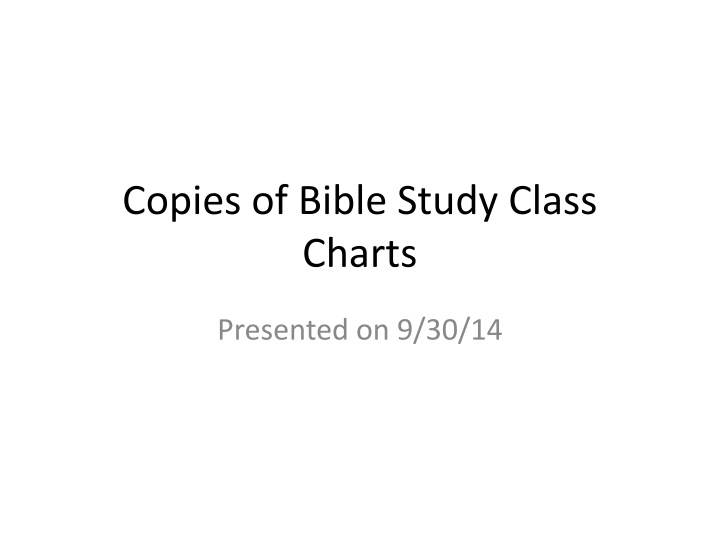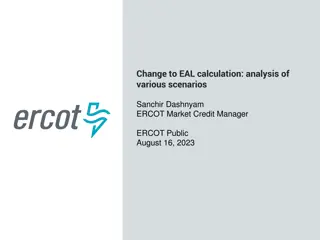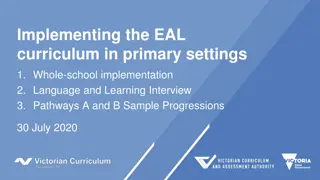Implementing Victorian F-10 EAL Curriculum
This presentation for teachers new to EAL student instruction focuses on using the Victorian F-10 EAL Curriculum, considerations for schools, unpacking pathways A, B, and C, navigating the curriculum, and promoting plurilingualism in classrooms. It emphasizes the responsibility of all teachers to support EAL learners in accessing subject-area content and language learning.
Download Presentation

Please find below an Image/Link to download the presentation.
The content on the website is provided AS IS for your information and personal use only. It may not be sold, licensed, or shared on other websites without obtaining consent from the author.If you encounter any issues during the download, it is possible that the publisher has removed the file from their server.
You are allowed to download the files provided on this website for personal or commercial use, subject to the condition that they are used lawfully. All files are the property of their respective owners.
The content on the website is provided AS IS for your information and personal use only. It may not be sold, licensed, or shared on other websites without obtaining consent from the author.
E N D
Presentation Transcript
Copies of Bible Study Class Charts Presented on 9/30/14
A Prayer to be recited before reading the Sacred Scriptures Come, Holy Spirit, fill the hearts of Thy faithful and enkindle in them the fire of Thy love. Send forth Thy spirit and they shall be created. And thou shall renew the face of the earth Let Us Pray O God, Who didst instruct the hearts of the faithful by the light of the Holy Spirit, grant us by the same Spirit to have a right judgment in all things and ever to rejoice in His consolation. Through Christ our Lord Let Us Pray
Clarification Almost everything I present is directly from notes from my classes at NDGS Sometimes I research the internet to flesh out certain points from my notes One such addition dealt with the background descriptions of the 12 Apostles where I said that Matthew, James and Thaddaeus were brothers The fact is that all were listed as a son of Alpheus The gospels specifically state that Peter and Andrew were brothers and James and John were brothers but they do not state that the other three were brothers (could have been cousins) I should have said that those three may have been brothers!
Acts 1 Acts 1:1-3 In the first book, O Theophilus, I have dealt with all that Jesus began to do and teach, appearing to them during forty days, and speaking of the kingdom of God. The first book is the Gospel of Luke Theophilus means God lover or Friend of God He could been a benefactor supporting Luke Or, and most likely, this was not the name of an individual in the early Church, even though Luke dedicated both of his books to him It is similar to someone getting into the pulpit and saying brothers and sisters or dearly beloved or my fellow Christians Thus,it can be seen as a term of endearment for Luke s audience
Acts 1 (Cont) Appearing to them during forty days This number appears throughout the Old and New Testament It is the equivalent of us saying about one month That could be a range of 20 to 40 days or an approximate period of time But Luke is giving this term for a very specific reason as he wants to make sure the reader is aware of a specific chronology The death of Jesus occurred around the time of the major Jewish festival of Passover (the first in the Jewish liturgical cycle) which was as important for the 1st Century Jew as Christmas and Easter is for the Christian today So the Ascension of Jesus is happening some 40 days after the Passover and just 10 days before the second major Jewish feast of Pentecost
Acts 1 (Cont) The Kingdom of God is not fluffy clouds and angels flying around with musical instruments For almost every 1stCentury Jew this was the Kingdom of Israel It is God s Kingdom and He is their (our) king Look at: Ex 19 where God brings the people of Israel out of Egypt as their king I Sam 8 where Israel rejects God as their king and demands a human king At this point (40 days after the resurrection) Israel is waiting for the return of the Kingdom of Israel as an independent and free kingdom which has not been seen since the time of Solomon
Acts 1 (Cont) The Prophets foretold that after the Babylonian exile: A Son of David (one of his descendants) would rebuild the Temple The Glory Cloud (Shekinah the visible manifestation of the presence of God) would return and be visible in the Temple (Ez 43:4) A son of David would rule forever (Is 9:7) But none of this was happening! So everyone was waiting for arrival of this specific kingdom and they kept wondering when will this happen?
Review To set the stage for Acts 1 we need to look at the end of Luke s gospel (Lk 24:36-53) which Luke must have assumed you would have access to as he only summarizes these teachings in Acts 1:1-5 Approximate dates for the completion of Luke s two books are: 60-69 A.D. Luke s Gospel completed 62-68 A.D. Acts of the Apostles completed
Luke 24 Lk 24:36 Jesus himself stood among them, and said to them Peace to you. Then he asked for some fish which he ate so they would realize that he was not a ghost. Acts 1:3 Jesus presented himself alive.. during forty days Lk 24:44 Jesus said to them, These are my words which I spoke to you, while I was with you, that everything written about me in the law prophets and the psalms must be fulfilled Remember how the hearts of the two disciples on the road were on fire when he discussed the scriptures with them? Here the prophets means the rest of the inspired scriptures (prophets, historical book, wisdom and the Psalms the rest of our Old Testament canon)
Luke 24 (Cont) The Sadducees only believed the Law was inspired The Pharisees believed that all of the scripture including the Psalms were inspired Luke, and Paul (and therefore the rest of Christianity) accept the position of the Pharisees Jesus quotes from the prophets and Psalms when talking to the Pharisees but only from the Law with the Sadducees This division becomes a major flash point for Paul
Luke 24 (Cont) Lk 24:45-47 Then he opened their minds to understand the scriptures, and said to them, Thus it is written that the Christ should suffer and on the third day rise from the dead, to all nations, beginning from Jerusalem. What about his command to the disciples to go to Galilee? He did tell the women to instruct the disciples to go to Galilee He appeared to the disciples many times during the 40 days there But he instructed them to return to Jerusalem for it was from there he would ascend into heaven across the Kidron Valley on the Mount of Olives Again we see this call for the Apostles to remain in Jerusalem in Acts 1:8
Luke 24 (Cont) Lk 24:49 We find his promise of the coming of the Holy Spirit coming from on high This is again being filled with the Holy Spirit is be promised in Acts 1:5
Acts 1 (Cont) Acts 1:4-5 And while staying with them he charged them not to depart from Jerusalem John baptized with water, but before many days you shall be baptized with the Holy Spirit As Jesus ministry in Luke s gospel began with his Baptism by John, so the Apostles ministry will begin in a similar manner with the descent of the Holy Spirit at Pentecost on the Apostles
Acts 1 (Cont) Acts 1:6 So when they had come together, they asked him, Lord, will you at this time restore the kingdom of Israel? Notice how the early Christians understood their identity with Israel Also, the Apostles seemed to be a bit confused about what the nature of this Kingdom was going to be At the Last Supper Jesus talks about swords (Lk 22:38) In the Garden of Gethsemane Peter cuts off the ear of the High Priest s servant before Jesus tells him to stop So the Apostles think they are going to capture Jerusalem and establish the Kingdom by the sword Imagine how they must have felt when Jesus ends up dying on the cross! Jesus answers this question by expressing some very important words to them that are still important for us today
Acts 1 (Cont) Acts 1:7 He said to them, It is not for you to know times or seasons which the Father has fixed by his own authority Jesus is saying that the kingdom will be established but not in the manner they think (by the sword, horses and chariots) It will be much more glorious than that of Solomon s kingdom and Jesus will rule over all of the world forever Jesus tells them (and us) to stop worrying about how all these things will come about
Acts 1 (Cont) This was important for them and still is for us today as we waste time trying to calculate when the world is going to end (millennialism) Jesus is telling them, and us, that figuring this out is not our job because God is driving this bus The job of the Apostles, the job of the Church, and our job is to do what Jesus has called us to do, which is to: Go out and baptize and preach to all the nations He is not saying that things like social work is not important but it is not more important than preaching the gospel and baptizing the people Putting food in the mouths of people is not as important as giving them eternal life!
Acts 1 (Cont) Acts 1:8 But you shall receive power when the Holy Spirit has come upon you; and you shall be my witnesses in Jerusalem, and in all Judea and Samaria and to the end of the earth The Greek word translated as witnesses is martys which is often rendered in English as martyr The power of the Holy Spirit becomes a major theme of Acts The Apostles are a witness to the resurrection of Jesus This geographical sequence is the major structure of Acts which will chronicle the spread of the gospel: Jerusalem Judea and Samaria The rest of the world
Acts 1 (Cont) Acts 1:9 And when he has said this, as they were looking on, he was lifted up and a cloud took him out of their sight. The Glory Cloud Shechinah (Hebrew) the visible manifestation of the presence of God Doxa Kurion (Greek) the Glory of the Lord the concept of dwelling or abiding was seen when: God was walking in the garden with Adam The cloud lead Israel during the Exodus The presence of God was in the tent of meeting when talking with Moses The presence (and departure) of God was in the Temple of Solomon The Spirit overshadowed the Blessed Virgin The cloud was a part of the Transfiguration Pope Benedict's explanation of the Ascension*























